Analyzing Theoretical Concepts of Privilege and Oppression in Society
VerifiedAdded on 2023/06/07
|11
|2589
|432
Report
AI Summary
This report delves into the theoretical concepts of privilege and oppression, defining these terms and exploring their manifestations across different social groups. It examines various forms of privilege, including white privilege, religious privilege, gender privilege, and socio-economic privilege, highlighting how these advantages contribute to the oppression of subordinate groups. The report analyzes specific examples of oppression based on gender, race, and religion, as well as the oppression of migrants. Furthermore, it investigates how dominant groups maintain their power and privileges, focusing on gender discrimination in housing, the workplace, civil rights, and opportunities. Finally, it explores the role of tertiary-educated professional welfare workers in addressing and, potentially, inadvertently contributing to the oppression of minority groups, emphasizing the complex nature of social work and the importance of minimizing oppression to maximize benefits for all. This report is an insightful analysis of social inequality.
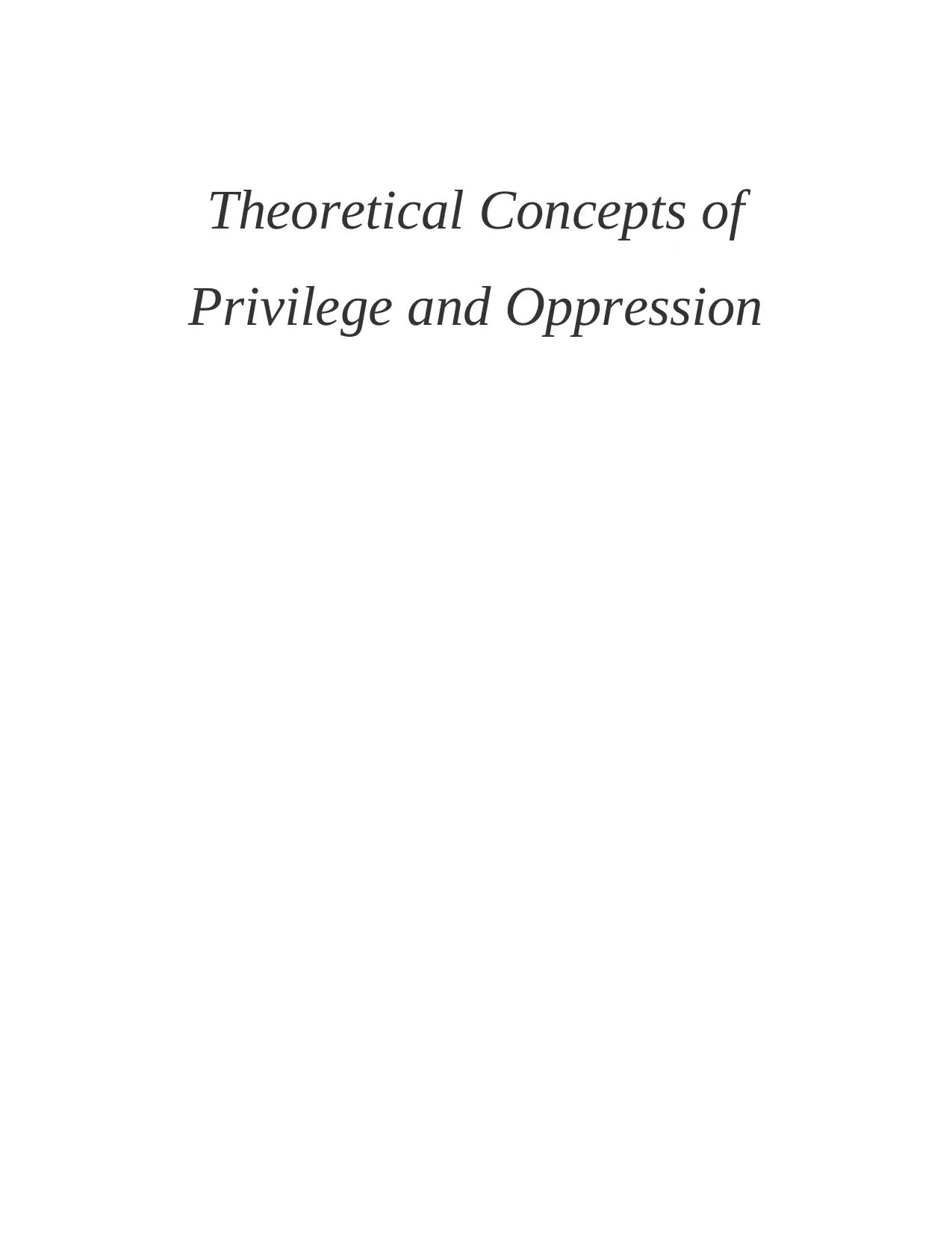
Theoretical Concepts of
Privilege and Oppression
Privilege and Oppression
Paraphrase This Document
Need a fresh take? Get an instant paraphrase of this document with our AI Paraphraser
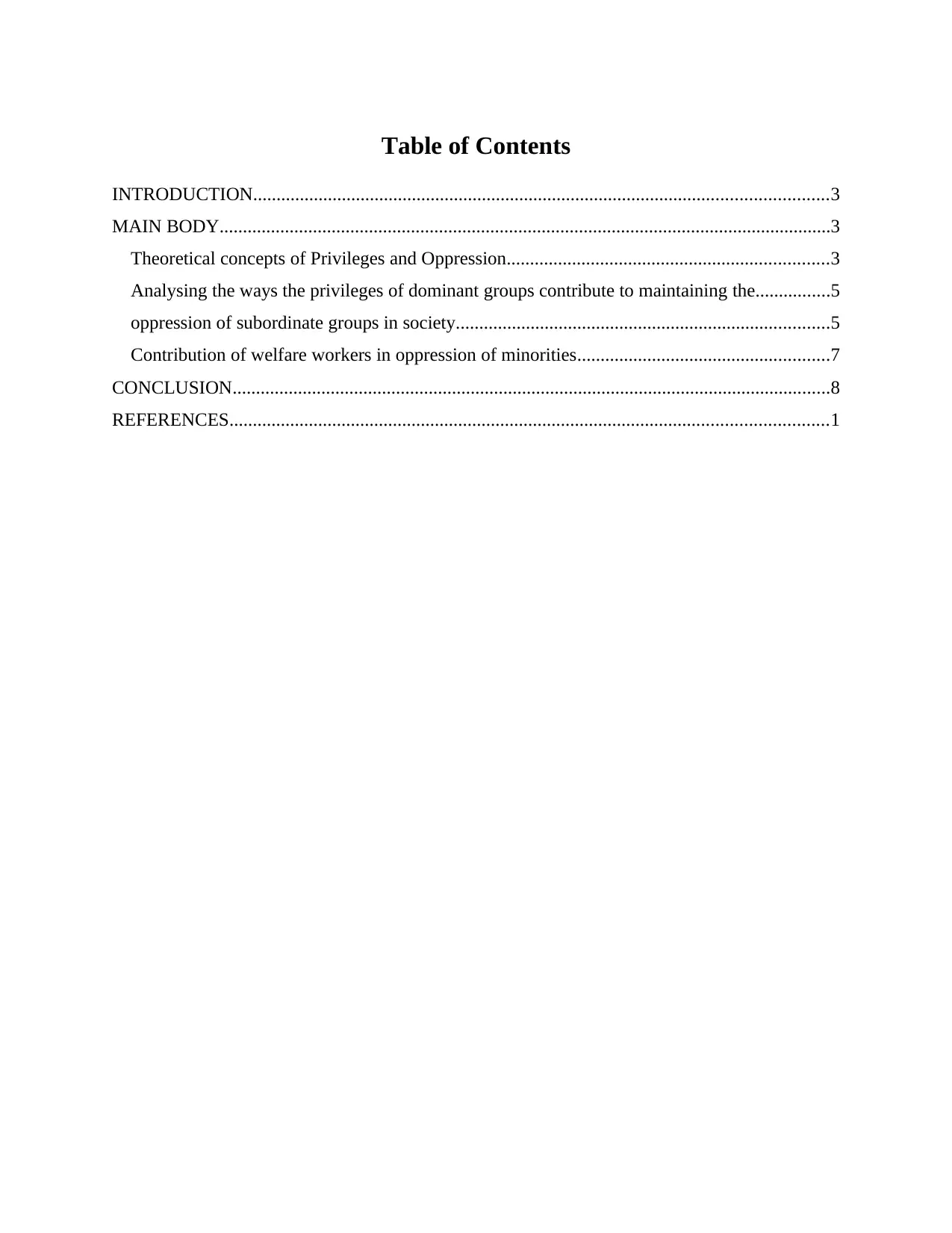
Table of Contents
INTRODUCTION...........................................................................................................................3
MAIN BODY...................................................................................................................................3
Theoretical concepts of Privileges and Oppression.....................................................................3
Analysing the ways the privileges of dominant groups contribute to maintaining the................5
oppression of subordinate groups in society................................................................................5
Contribution of welfare workers in oppression of minorities......................................................7
CONCLUSION................................................................................................................................8
REFERENCES................................................................................................................................1
INTRODUCTION...........................................................................................................................3
MAIN BODY...................................................................................................................................3
Theoretical concepts of Privileges and Oppression.....................................................................3
Analysing the ways the privileges of dominant groups contribute to maintaining the................5
oppression of subordinate groups in society................................................................................5
Contribution of welfare workers in oppression of minorities......................................................7
CONCLUSION................................................................................................................................8
REFERENCES................................................................................................................................1
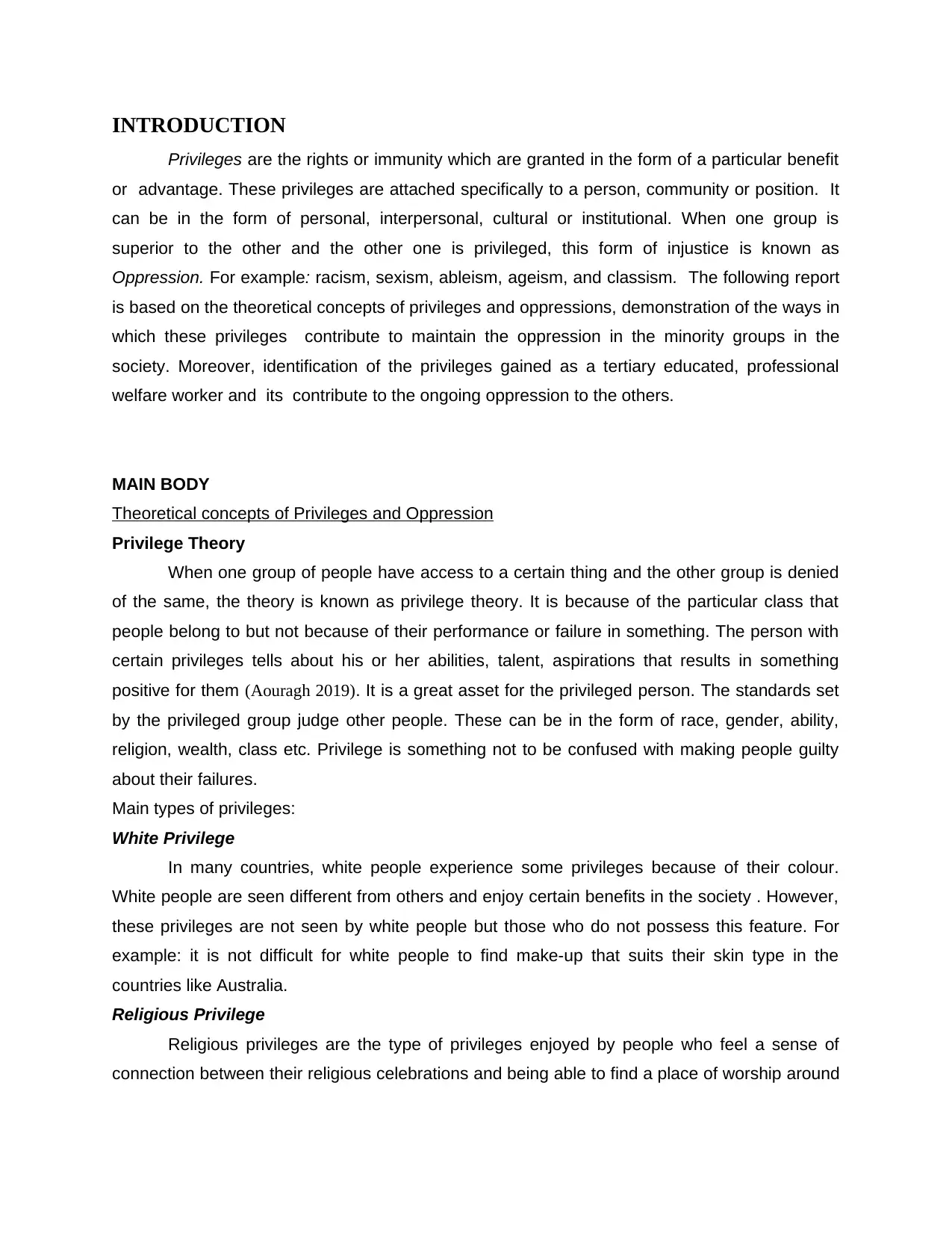
INTRODUCTION
Privileges are the rights or immunity which are granted in the form of a particular benefit
or advantage. These privileges are attached specifically to a person, community or position. It
can be in the form of personal, interpersonal, cultural or institutional. When one group is
superior to the other and the other one is privileged, this form of injustice is known as
Oppression. For example: racism, sexism, ableism, ageism, and classism. The following report
is based on the theoretical concepts of privileges and oppressions, demonstration of the ways in
which these privileges contribute to maintain the oppression in the minority groups in the
society. Moreover, identification of the privileges gained as a tertiary educated, professional
welfare worker and its contribute to the ongoing oppression to the others.
MAIN BODY
Theoretical concepts of Privileges and Oppression
Privilege Theory
When one group of people have access to a certain thing and the other group is denied
of the same, the theory is known as privilege theory. It is because of the particular class that
people belong to but not because of their performance or failure in something. The person with
certain privileges tells about his or her abilities, talent, aspirations that results in something
positive for them (Aouragh 2019). It is a great asset for the privileged person. The standards set
by the privileged group judge other people. These can be in the form of race, gender, ability,
religion, wealth, class etc. Privilege is something not to be confused with making people guilty
about their failures.
Main types of privileges:
White Privilege
In many countries, white people experience some privileges because of their colour.
White people are seen different from others and enjoy certain benefits in the society . However,
these privileges are not seen by white people but those who do not possess this feature. For
example: it is not difficult for white people to find make-up that suits their skin type in the
countries like Australia.
Religious Privilege
Religious privileges are the type of privileges enjoyed by people who feel a sense of
connection between their religious celebrations and being able to find a place of worship around
Privileges are the rights or immunity which are granted in the form of a particular benefit
or advantage. These privileges are attached specifically to a person, community or position. It
can be in the form of personal, interpersonal, cultural or institutional. When one group is
superior to the other and the other one is privileged, this form of injustice is known as
Oppression. For example: racism, sexism, ableism, ageism, and classism. The following report
is based on the theoretical concepts of privileges and oppressions, demonstration of the ways in
which these privileges contribute to maintain the oppression in the minority groups in the
society. Moreover, identification of the privileges gained as a tertiary educated, professional
welfare worker and its contribute to the ongoing oppression to the others.
MAIN BODY
Theoretical concepts of Privileges and Oppression
Privilege Theory
When one group of people have access to a certain thing and the other group is denied
of the same, the theory is known as privilege theory. It is because of the particular class that
people belong to but not because of their performance or failure in something. The person with
certain privileges tells about his or her abilities, talent, aspirations that results in something
positive for them (Aouragh 2019). It is a great asset for the privileged person. The standards set
by the privileged group judge other people. These can be in the form of race, gender, ability,
religion, wealth, class etc. Privilege is something not to be confused with making people guilty
about their failures.
Main types of privileges:
White Privilege
In many countries, white people experience some privileges because of their colour.
White people are seen different from others and enjoy certain benefits in the society . However,
these privileges are not seen by white people but those who do not possess this feature. For
example: it is not difficult for white people to find make-up that suits their skin type in the
countries like Australia.
Religious Privilege
Religious privileges are the type of privileges enjoyed by people who feel a sense of
connection between their religious celebrations and being able to find a place of worship around
⊘ This is a preview!⊘
Do you want full access?
Subscribe today to unlock all pages.

Trusted by 1+ million students worldwide
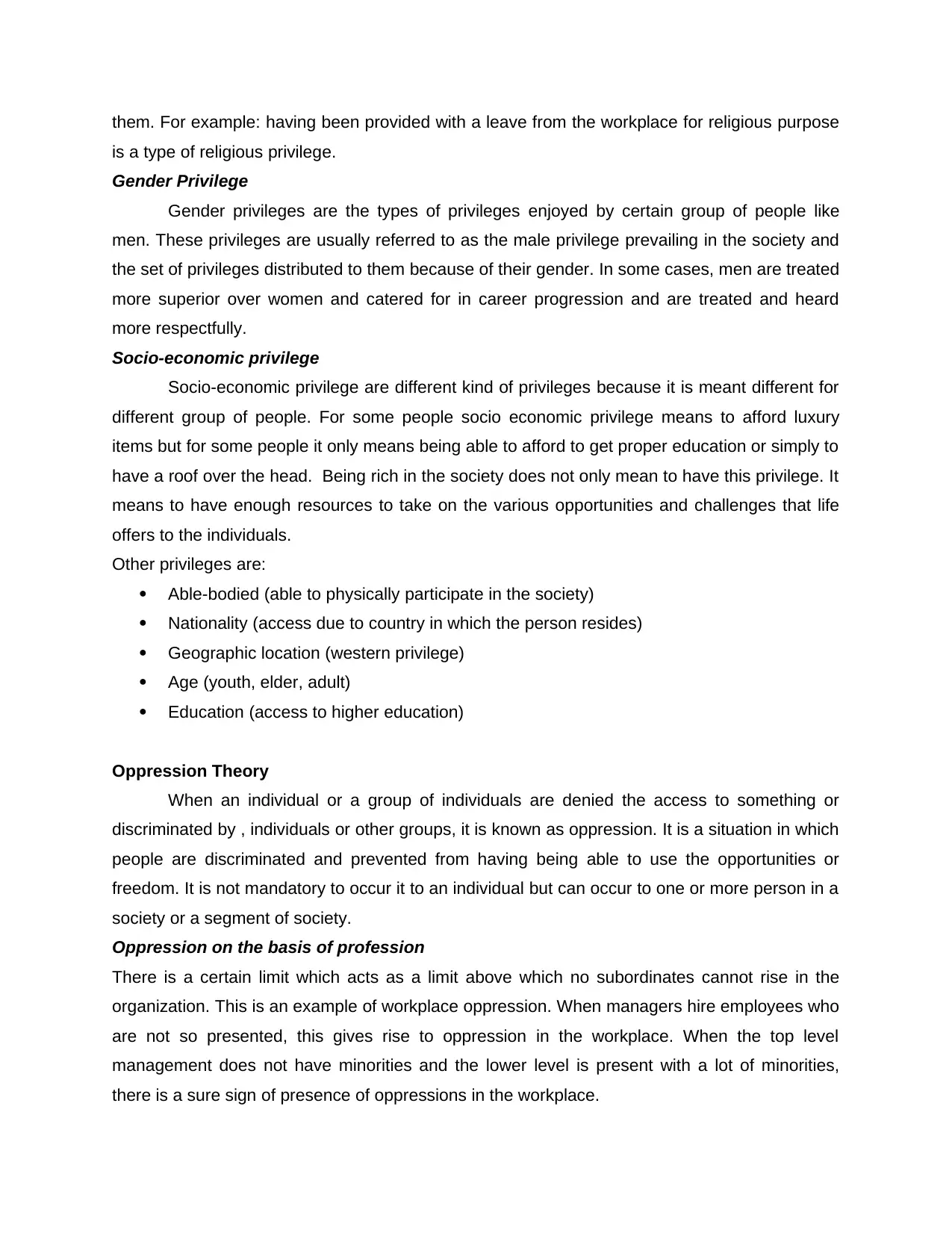
them. For example: having been provided with a leave from the workplace for religious purpose
is a type of religious privilege.
Gender Privilege
Gender privileges are the types of privileges enjoyed by certain group of people like
men. These privileges are usually referred to as the male privilege prevailing in the society and
the set of privileges distributed to them because of their gender. In some cases, men are treated
more superior over women and catered for in career progression and are treated and heard
more respectfully.
Socio-economic privilege
Socio-economic privilege are different kind of privileges because it is meant different for
different group of people. For some people socio economic privilege means to afford luxury
items but for some people it only means being able to afford to get proper education or simply to
have a roof over the head. Being rich in the society does not only mean to have this privilege. It
means to have enough resources to take on the various opportunities and challenges that life
offers to the individuals.
Other privileges are:
Able-bodied (able to physically participate in the society)
Nationality (access due to country in which the person resides)
Geographic location (western privilege)
Age (youth, elder, adult)
Education (access to higher education)
Oppression Theory
When an individual or a group of individuals are denied the access to something or
discriminated by , individuals or other groups, it is known as oppression. It is a situation in which
people are discriminated and prevented from having being able to use the opportunities or
freedom. It is not mandatory to occur it to an individual but can occur to one or more person in a
society or a segment of society.
Oppression on the basis of profession
There is a certain limit which acts as a limit above which no subordinates cannot rise in the
organization. This is an example of workplace oppression. When managers hire employees who
are not so presented, this gives rise to oppression in the workplace. When the top level
management does not have minorities and the lower level is present with a lot of minorities,
there is a sure sign of presence of oppressions in the workplace.
is a type of religious privilege.
Gender Privilege
Gender privileges are the types of privileges enjoyed by certain group of people like
men. These privileges are usually referred to as the male privilege prevailing in the society and
the set of privileges distributed to them because of their gender. In some cases, men are treated
more superior over women and catered for in career progression and are treated and heard
more respectfully.
Socio-economic privilege
Socio-economic privilege are different kind of privileges because it is meant different for
different group of people. For some people socio economic privilege means to afford luxury
items but for some people it only means being able to afford to get proper education or simply to
have a roof over the head. Being rich in the society does not only mean to have this privilege. It
means to have enough resources to take on the various opportunities and challenges that life
offers to the individuals.
Other privileges are:
Able-bodied (able to physically participate in the society)
Nationality (access due to country in which the person resides)
Geographic location (western privilege)
Age (youth, elder, adult)
Education (access to higher education)
Oppression Theory
When an individual or a group of individuals are denied the access to something or
discriminated by , individuals or other groups, it is known as oppression. It is a situation in which
people are discriminated and prevented from having being able to use the opportunities or
freedom. It is not mandatory to occur it to an individual but can occur to one or more person in a
society or a segment of society.
Oppression on the basis of profession
There is a certain limit which acts as a limit above which no subordinates cannot rise in the
organization. This is an example of workplace oppression. When managers hire employees who
are not so presented, this gives rise to oppression in the workplace. When the top level
management does not have minorities and the lower level is present with a lot of minorities,
there is a sure sign of presence of oppressions in the workplace.
Paraphrase This Document
Need a fresh take? Get an instant paraphrase of this document with our AI Paraphraser
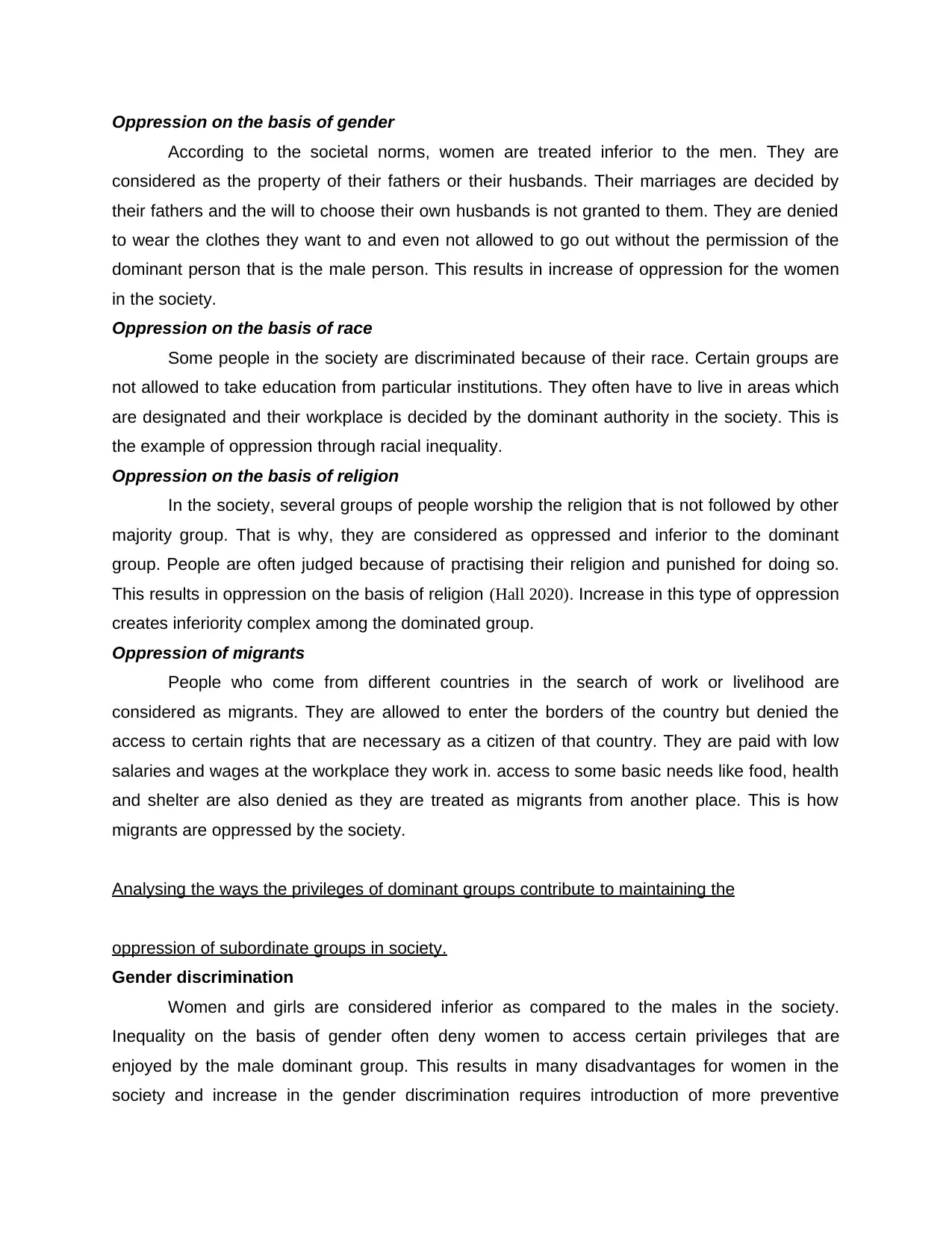
Oppression on the basis of gender
According to the societal norms, women are treated inferior to the men. They are
considered as the property of their fathers or their husbands. Their marriages are decided by
their fathers and the will to choose their own husbands is not granted to them. They are denied
to wear the clothes they want to and even not allowed to go out without the permission of the
dominant person that is the male person. This results in increase of oppression for the women
in the society.
Oppression on the basis of race
Some people in the society are discriminated because of their race. Certain groups are
not allowed to take education from particular institutions. They often have to live in areas which
are designated and their workplace is decided by the dominant authority in the society. This is
the example of oppression through racial inequality.
Oppression on the basis of religion
In the society, several groups of people worship the religion that is not followed by other
majority group. That is why, they are considered as oppressed and inferior to the dominant
group. People are often judged because of practising their religion and punished for doing so.
This results in oppression on the basis of religion (Hall 2020). Increase in this type of oppression
creates inferiority complex among the dominated group.
Oppression of migrants
People who come from different countries in the search of work or livelihood are
considered as migrants. They are allowed to enter the borders of the country but denied the
access to certain rights that are necessary as a citizen of that country. They are paid with low
salaries and wages at the workplace they work in. access to some basic needs like food, health
and shelter are also denied as they are treated as migrants from another place. This is how
migrants are oppressed by the society.
Analysing the ways the privileges of dominant groups contribute to maintaining the
oppression of subordinate groups in society.
Gender discrimination
Women and girls are considered inferior as compared to the males in the society.
Inequality on the basis of gender often deny women to access certain privileges that are
enjoyed by the male dominant group. This results in many disadvantages for women in the
society and increase in the gender discrimination requires introduction of more preventive
According to the societal norms, women are treated inferior to the men. They are
considered as the property of their fathers or their husbands. Their marriages are decided by
their fathers and the will to choose their own husbands is not granted to them. They are denied
to wear the clothes they want to and even not allowed to go out without the permission of the
dominant person that is the male person. This results in increase of oppression for the women
in the society.
Oppression on the basis of race
Some people in the society are discriminated because of their race. Certain groups are
not allowed to take education from particular institutions. They often have to live in areas which
are designated and their workplace is decided by the dominant authority in the society. This is
the example of oppression through racial inequality.
Oppression on the basis of religion
In the society, several groups of people worship the religion that is not followed by other
majority group. That is why, they are considered as oppressed and inferior to the dominant
group. People are often judged because of practising their religion and punished for doing so.
This results in oppression on the basis of religion (Hall 2020). Increase in this type of oppression
creates inferiority complex among the dominated group.
Oppression of migrants
People who come from different countries in the search of work or livelihood are
considered as migrants. They are allowed to enter the borders of the country but denied the
access to certain rights that are necessary as a citizen of that country. They are paid with low
salaries and wages at the workplace they work in. access to some basic needs like food, health
and shelter are also denied as they are treated as migrants from another place. This is how
migrants are oppressed by the society.
Analysing the ways the privileges of dominant groups contribute to maintaining the
oppression of subordinate groups in society.
Gender discrimination
Women and girls are considered inferior as compared to the males in the society.
Inequality on the basis of gender often deny women to access certain privileges that are
enjoyed by the male dominant group. This results in many disadvantages for women in the
society and increase in the gender discrimination requires introduction of more preventive
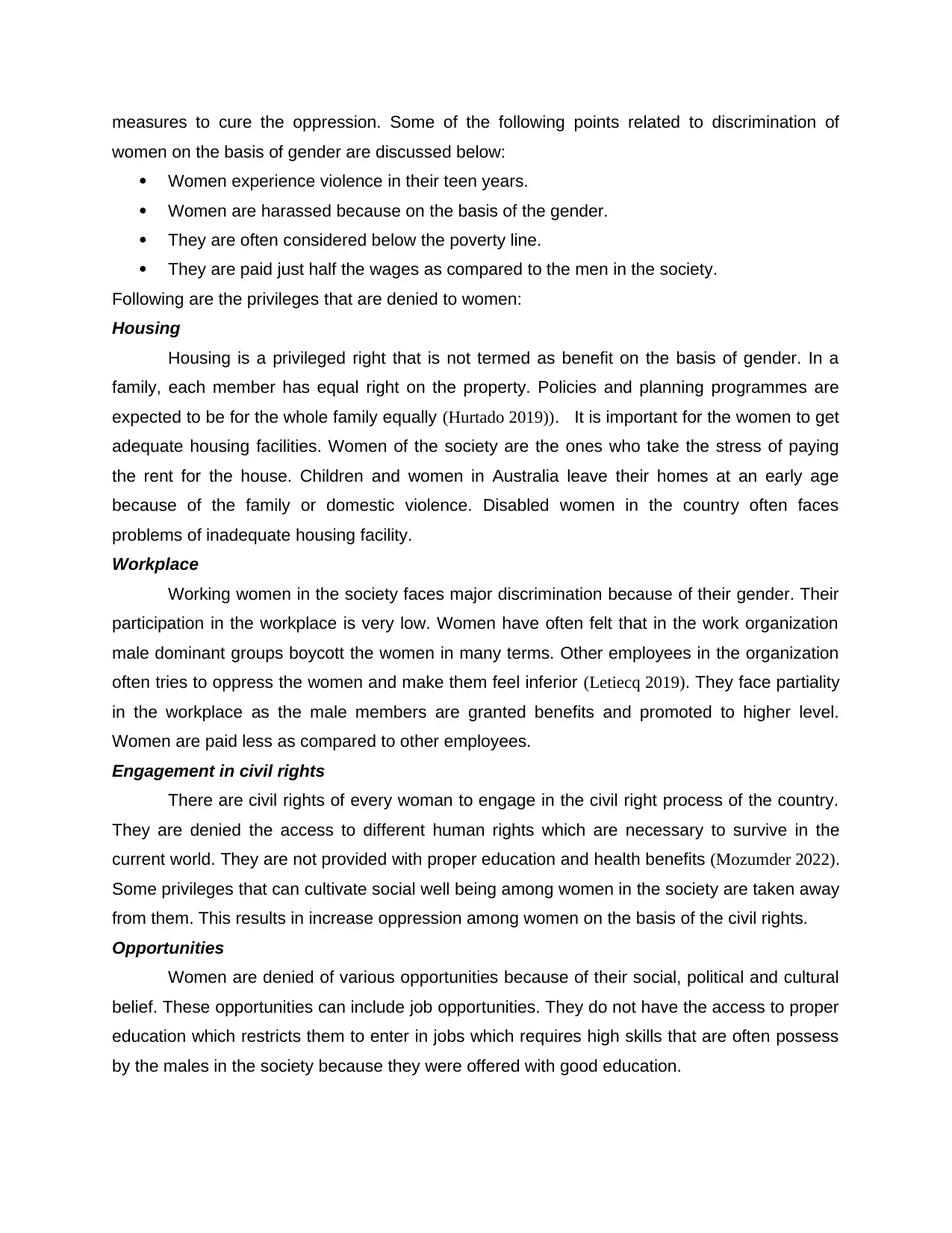
measures to cure the oppression. Some of the following points related to discrimination of
women on the basis of gender are discussed below:
Women experience violence in their teen years.
Women are harassed because on the basis of the gender.
They are often considered below the poverty line.
They are paid just half the wages as compared to the men in the society.
Following are the privileges that are denied to women:
Housing
Housing is a privileged right that is not termed as benefit on the basis of gender. In a
family, each member has equal right on the property. Policies and planning programmes are
expected to be for the whole family equally (Hurtado 2019)). It is important for the women to get
adequate housing facilities. Women of the society are the ones who take the stress of paying
the rent for the house. Children and women in Australia leave their homes at an early age
because of the family or domestic violence. Disabled women in the country often faces
problems of inadequate housing facility.
Workplace
Working women in the society faces major discrimination because of their gender. Their
participation in the workplace is very low. Women have often felt that in the work organization
male dominant groups boycott the women in many terms. Other employees in the organization
often tries to oppress the women and make them feel inferior (Letiecq 2019). They face partiality
in the workplace as the male members are granted benefits and promoted to higher level.
Women are paid less as compared to other employees.
Engagement in civil rights
There are civil rights of every woman to engage in the civil right process of the country.
They are denied the access to different human rights which are necessary to survive in the
current world. They are not provided with proper education and health benefits (Mozumder 2022).
Some privileges that can cultivate social well being among women in the society are taken away
from them. This results in increase oppression among women on the basis of the civil rights.
Opportunities
Women are denied of various opportunities because of their social, political and cultural
belief. These opportunities can include job opportunities. They do not have the access to proper
education which restricts them to enter in jobs which requires high skills that are often possess
by the males in the society because they were offered with good education.
women on the basis of gender are discussed below:
Women experience violence in their teen years.
Women are harassed because on the basis of the gender.
They are often considered below the poverty line.
They are paid just half the wages as compared to the men in the society.
Following are the privileges that are denied to women:
Housing
Housing is a privileged right that is not termed as benefit on the basis of gender. In a
family, each member has equal right on the property. Policies and planning programmes are
expected to be for the whole family equally (Hurtado 2019)). It is important for the women to get
adequate housing facilities. Women of the society are the ones who take the stress of paying
the rent for the house. Children and women in Australia leave their homes at an early age
because of the family or domestic violence. Disabled women in the country often faces
problems of inadequate housing facility.
Workplace
Working women in the society faces major discrimination because of their gender. Their
participation in the workplace is very low. Women have often felt that in the work organization
male dominant groups boycott the women in many terms. Other employees in the organization
often tries to oppress the women and make them feel inferior (Letiecq 2019). They face partiality
in the workplace as the male members are granted benefits and promoted to higher level.
Women are paid less as compared to other employees.
Engagement in civil rights
There are civil rights of every woman to engage in the civil right process of the country.
They are denied the access to different human rights which are necessary to survive in the
current world. They are not provided with proper education and health benefits (Mozumder 2022).
Some privileges that can cultivate social well being among women in the society are taken away
from them. This results in increase oppression among women on the basis of the civil rights.
Opportunities
Women are denied of various opportunities because of their social, political and cultural
belief. These opportunities can include job opportunities. They do not have the access to proper
education which restricts them to enter in jobs which requires high skills that are often possess
by the males in the society because they were offered with good education.
⊘ This is a preview!⊘
Do you want full access?
Subscribe today to unlock all pages.

Trusted by 1+ million students worldwide
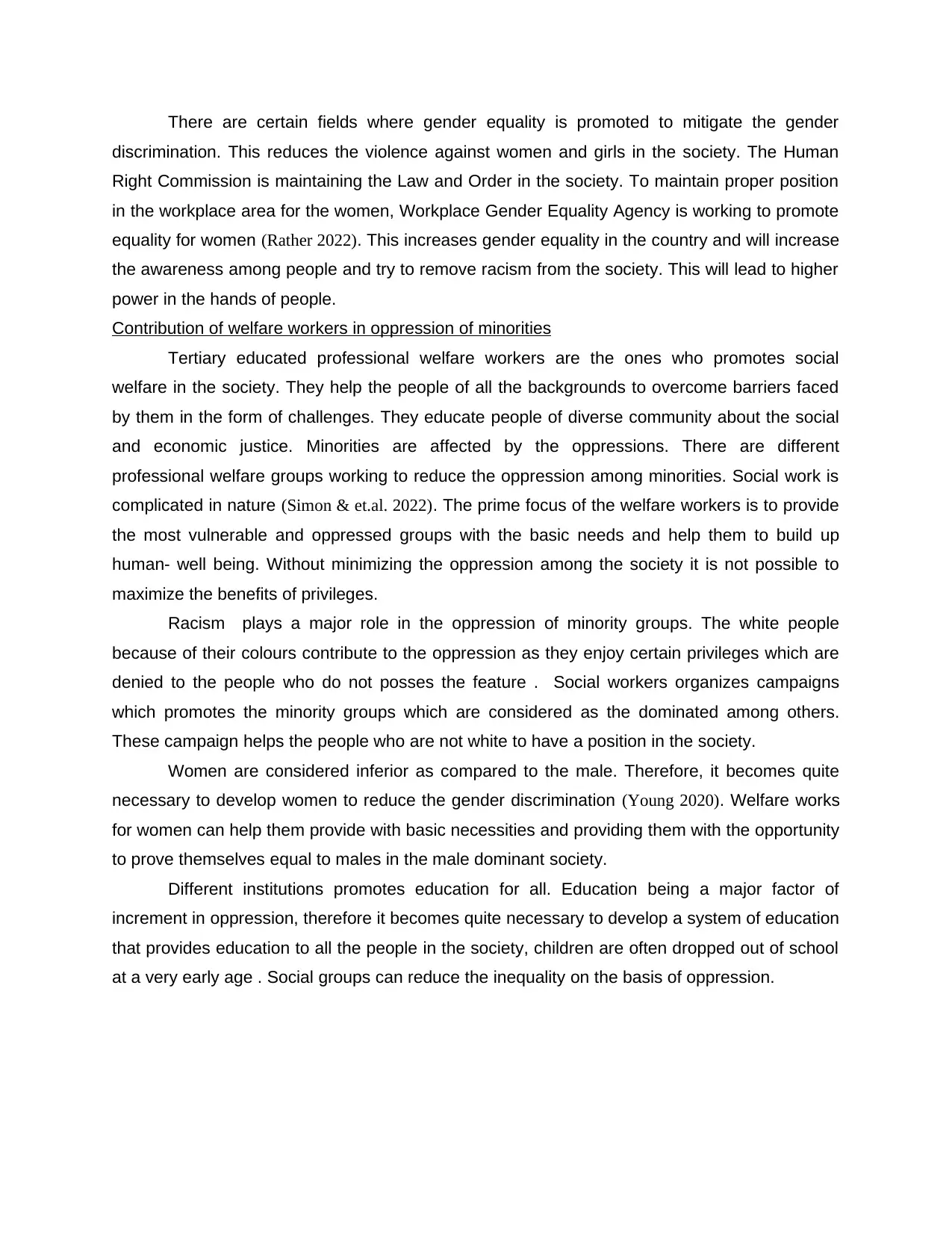
There are certain fields where gender equality is promoted to mitigate the gender
discrimination. This reduces the violence against women and girls in the society. The Human
Right Commission is maintaining the Law and Order in the society. To maintain proper position
in the workplace area for the women, Workplace Gender Equality Agency is working to promote
equality for women (Rather 2022). This increases gender equality in the country and will increase
the awareness among people and try to remove racism from the society. This will lead to higher
power in the hands of people.
Contribution of welfare workers in oppression of minorities
Tertiary educated professional welfare workers are the ones who promotes social
welfare in the society. They help the people of all the backgrounds to overcome barriers faced
by them in the form of challenges. They educate people of diverse community about the social
and economic justice. Minorities are affected by the oppressions. There are different
professional welfare groups working to reduce the oppression among minorities. Social work is
complicated in nature (Simon & et.al. 2022). The prime focus of the welfare workers is to provide
the most vulnerable and oppressed groups with the basic needs and help them to build up
human- well being. Without minimizing the oppression among the society it is not possible to
maximize the benefits of privileges.
Racism plays a major role in the oppression of minority groups. The white people
because of their colours contribute to the oppression as they enjoy certain privileges which are
denied to the people who do not posses the feature . Social workers organizes campaigns
which promotes the minority groups which are considered as the dominated among others.
These campaign helps the people who are not white to have a position in the society.
Women are considered inferior as compared to the male. Therefore, it becomes quite
necessary to develop women to reduce the gender discrimination (Young 2020). Welfare works
for women can help them provide with basic necessities and providing them with the opportunity
to prove themselves equal to males in the male dominant society.
Different institutions promotes education for all. Education being a major factor of
increment in oppression, therefore it becomes quite necessary to develop a system of education
that provides education to all the people in the society, children are often dropped out of school
at a very early age . Social groups can reduce the inequality on the basis of oppression.
discrimination. This reduces the violence against women and girls in the society. The Human
Right Commission is maintaining the Law and Order in the society. To maintain proper position
in the workplace area for the women, Workplace Gender Equality Agency is working to promote
equality for women (Rather 2022). This increases gender equality in the country and will increase
the awareness among people and try to remove racism from the society. This will lead to higher
power in the hands of people.
Contribution of welfare workers in oppression of minorities
Tertiary educated professional welfare workers are the ones who promotes social
welfare in the society. They help the people of all the backgrounds to overcome barriers faced
by them in the form of challenges. They educate people of diverse community about the social
and economic justice. Minorities are affected by the oppressions. There are different
professional welfare groups working to reduce the oppression among minorities. Social work is
complicated in nature (Simon & et.al. 2022). The prime focus of the welfare workers is to provide
the most vulnerable and oppressed groups with the basic needs and help them to build up
human- well being. Without minimizing the oppression among the society it is not possible to
maximize the benefits of privileges.
Racism plays a major role in the oppression of minority groups. The white people
because of their colours contribute to the oppression as they enjoy certain privileges which are
denied to the people who do not posses the feature . Social workers organizes campaigns
which promotes the minority groups which are considered as the dominated among others.
These campaign helps the people who are not white to have a position in the society.
Women are considered inferior as compared to the male. Therefore, it becomes quite
necessary to develop women to reduce the gender discrimination (Young 2020). Welfare works
for women can help them provide with basic necessities and providing them with the opportunity
to prove themselves equal to males in the male dominant society.
Different institutions promotes education for all. Education being a major factor of
increment in oppression, therefore it becomes quite necessary to develop a system of education
that provides education to all the people in the society, children are often dropped out of school
at a very early age . Social groups can reduce the inequality on the basis of oppression.
Paraphrase This Document
Need a fresh take? Get an instant paraphrase of this document with our AI Paraphraser
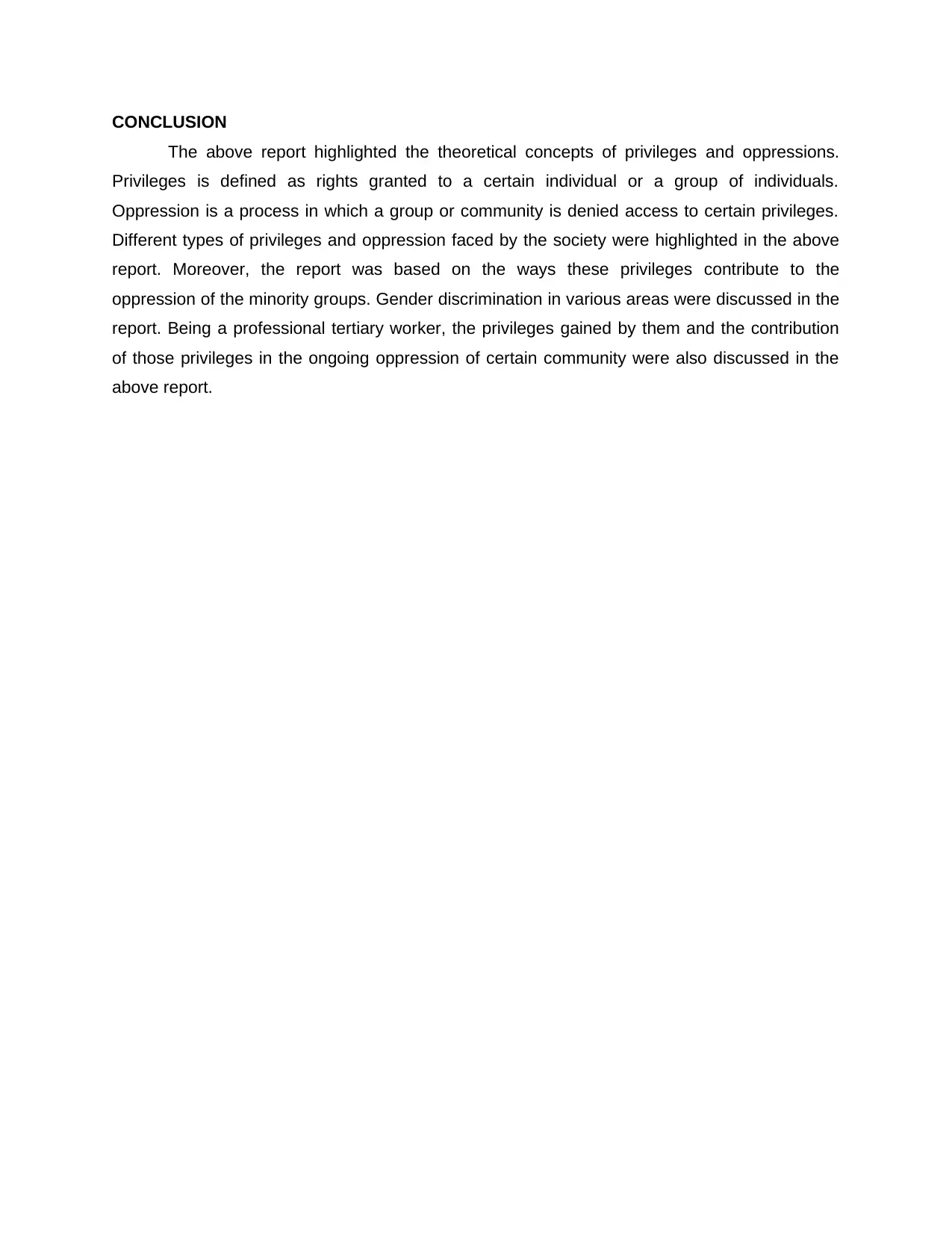
CONCLUSION
The above report highlighted the theoretical concepts of privileges and oppressions.
Privileges is defined as rights granted to a certain individual or a group of individuals.
Oppression is a process in which a group or community is denied access to certain privileges.
Different types of privileges and oppression faced by the society were highlighted in the above
report. Moreover, the report was based on the ways these privileges contribute to the
oppression of the minority groups. Gender discrimination in various areas were discussed in the
report. Being a professional tertiary worker, the privileges gained by them and the contribution
of those privileges in the ongoing oppression of certain community were also discussed in the
above report.
The above report highlighted the theoretical concepts of privileges and oppressions.
Privileges is defined as rights granted to a certain individual or a group of individuals.
Oppression is a process in which a group or community is denied access to certain privileges.
Different types of privileges and oppression faced by the society were highlighted in the above
report. Moreover, the report was based on the ways these privileges contribute to the
oppression of the minority groups. Gender discrimination in various areas were discussed in the
report. Being a professional tertiary worker, the privileges gained by them and the contribution
of those privileges in the ongoing oppression of certain community were also discussed in the
above report.
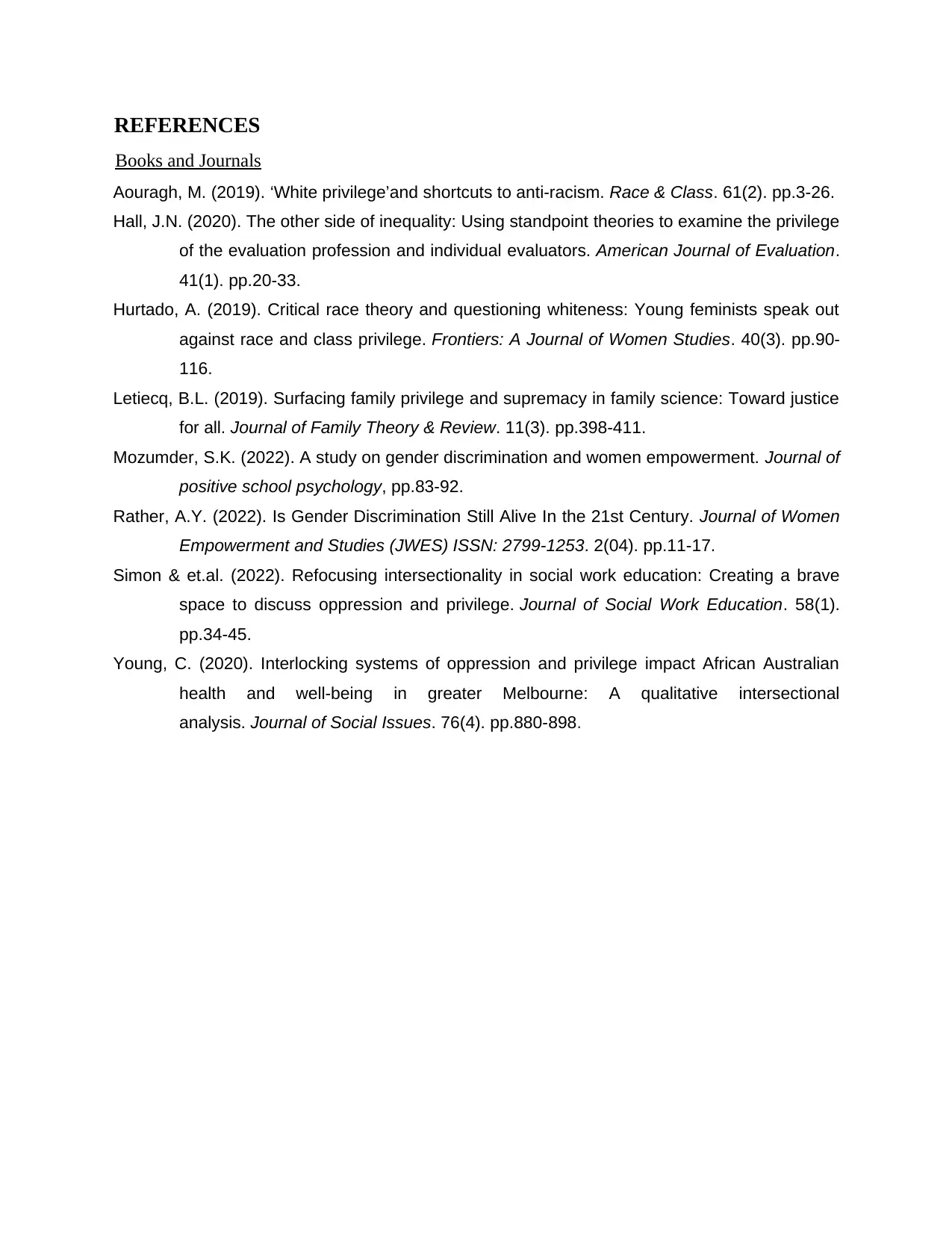
REFERENCES
Books and Journals
Aouragh, M. (2019). ‘White privilege’and shortcuts to anti-racism. Race & Class. 61(2). pp.3-26.
Hall, J.N. (2020). The other side of inequality: Using standpoint theories to examine the privilege
of the evaluation profession and individual evaluators. American Journal of Evaluation.
41(1). pp.20-33.
Hurtado, A. (2019). Critical race theory and questioning whiteness: Young feminists speak out
against race and class privilege. Frontiers: A Journal of Women Studies. 40(3). pp.90-
116.
Letiecq, B.L. (2019). Surfacing family privilege and supremacy in family science: Toward justice
for all. Journal of Family Theory & Review. 11(3). pp.398-411.
Mozumder, S.K. (2022). A study on gender discrimination and women empowerment. Journal of
positive school psychology, pp.83-92.
Rather, A.Y. (2022). Is Gender Discrimination Still Alive In the 21st Century. Journal of Women
Empowerment and Studies (JWES) ISSN: 2799-1253. 2(04). pp.11-17.
Simon & et.al. (2022). Refocusing intersectionality in social work education: Creating a brave
space to discuss oppression and privilege. Journal of Social Work Education. 58(1).
pp.34-45.
Young, C. (2020). Interlocking systems of oppression and privilege impact African Australian
health and well‐being in greater Melbourne: A qualitative intersectional
analysis. Journal of Social Issues. 76(4). pp.880-898.
Books and Journals
Aouragh, M. (2019). ‘White privilege’and shortcuts to anti-racism. Race & Class. 61(2). pp.3-26.
Hall, J.N. (2020). The other side of inequality: Using standpoint theories to examine the privilege
of the evaluation profession and individual evaluators. American Journal of Evaluation.
41(1). pp.20-33.
Hurtado, A. (2019). Critical race theory and questioning whiteness: Young feminists speak out
against race and class privilege. Frontiers: A Journal of Women Studies. 40(3). pp.90-
116.
Letiecq, B.L. (2019). Surfacing family privilege and supremacy in family science: Toward justice
for all. Journal of Family Theory & Review. 11(3). pp.398-411.
Mozumder, S.K. (2022). A study on gender discrimination and women empowerment. Journal of
positive school psychology, pp.83-92.
Rather, A.Y. (2022). Is Gender Discrimination Still Alive In the 21st Century. Journal of Women
Empowerment and Studies (JWES) ISSN: 2799-1253. 2(04). pp.11-17.
Simon & et.al. (2022). Refocusing intersectionality in social work education: Creating a brave
space to discuss oppression and privilege. Journal of Social Work Education. 58(1).
pp.34-45.
Young, C. (2020). Interlocking systems of oppression and privilege impact African Australian
health and well‐being in greater Melbourne: A qualitative intersectional
analysis. Journal of Social Issues. 76(4). pp.880-898.
⊘ This is a preview!⊘
Do you want full access?
Subscribe today to unlock all pages.

Trusted by 1+ million students worldwide

Paraphrase This Document
Need a fresh take? Get an instant paraphrase of this document with our AI Paraphraser

3
1 out of 11
Related Documents
Your All-in-One AI-Powered Toolkit for Academic Success.
+13062052269
info@desklib.com
Available 24*7 on WhatsApp / Email
![[object Object]](/_next/static/media/star-bottom.7253800d.svg)
Unlock your academic potential
Copyright © 2020–2025 A2Z Services. All Rights Reserved. Developed and managed by ZUCOL.





